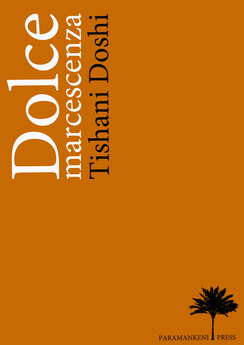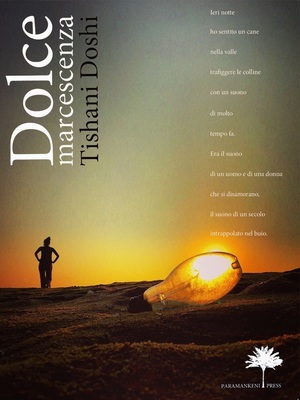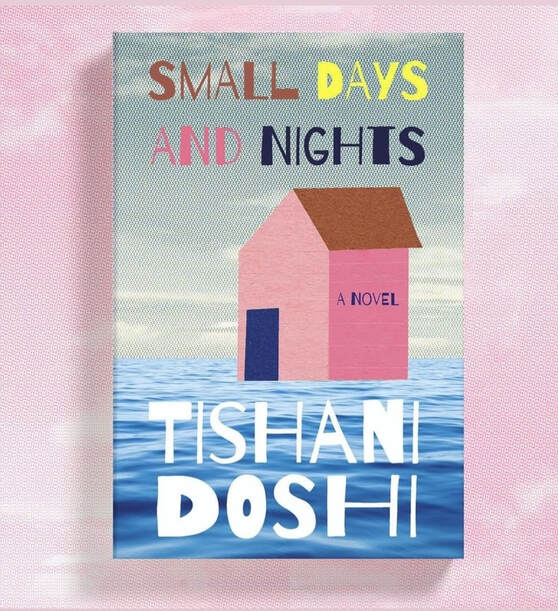
'Tishani Doshi brings all her skills as one of the world's best poets to this lovely, beguiling, brilliant novel. Run, don't walk to your nearest bookseller.'
GARY SHTEYNGART
‘This is a glorious book of immense power and beauty. I can’t stop thinking of Grace and Lucy and their band of dogs.’
KAMILA SHAMSIE
'Every sentence in this achingly beautiful book carries multiple meanings that resonate across the pages. Tishani Doshi uses language like a blade, cutting through our defenses to illuminate what it means to love, and forgive, and truly exist in the life we have.'
MAAZA MENGISTE
'A beautiful gem of a book full of heartbreak and joy. A deep exploration of what it is to be within family and what it is to occupy your own skin and the ebb and flow between the two.'
NAYOMI MUNAWEERA
Small Days and Nights has a beautifully restrained voice. I found myself reading it compulsively, drawn through the book on a knife edge. She manages humour in the saddest of moments, and tension in the quietest.’
EVIE WYLD, Jury of Ondaatje Prize
‘An astonishing novel that is beautifully written but underpinned by a quiet simmering anger about injustice and unrealistic expectations of a family – and of life in contemporary India.’
PETER FRANKOPAN, Jury of Ondaatje Prize
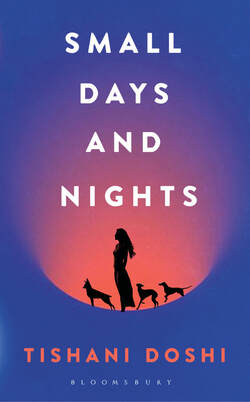
"Small Days and Nights is about disjunction, dislocation and the failure to meet impossible ideals of nationhood, womanhood and parenthood. The title is surely ironic, because this is a concise novel of staggering depth...In its vivid setting, the novel is not exactly a paean to modern India so much as a piercing Munchian howl of grief." BIDISHA, THE OBSERVER
"Radiantly written, with a couple of interludes in Venice where Grace's father lives, this superb novel from Doshi (Orange-prize longlisted for The Pleasure Seekers) ranges over family secrets, trying to do the right thing, and the sheer contingency of life in all its richness and uncertainty." THE SUNDAY TIMES
"Fiction that chooses the domestic for its sphere, especially fiction populated by women is routinely considered narrow, feeble, written for women. Yet the battles for power and control in the domestic sphere and in the community in the 'small days' of this novel, are what shape the fabric of life ..." ANURADHA ROY, THE INDIAN EXPRESS
"Small Days and Nights is a novel about contemporary India in the best sense. It’s not a literary Lonely Planet guide to inequality, women’s experience of public space, or the challenges of caring for a person with disabilities in the “third world"—even though all these concerns are at the heart of the story. Instead, Doshi’s writing is lit by palpable rage as well as visceral affection, often for the same things. Raw injustice is not always harnessed into forgiveness and if situations jolt us into questions, we do not always have the comfort of answers." SOMAK GHOSHAL, MINT LOUNGE
"India is too complex and immense, too historically storied to attempt the "great Indian novel". "I wanted to write the Great Paramankeni Novel. Or at least, the Small But Relevant Paramankeni Novel." And, so, she has and it is electrifying." SYDNEY MORNING HERALD
"Radiantly written, with a couple of interludes in Venice where Grace's father lives, this superb novel from Doshi (Orange-prize longlisted for The Pleasure Seekers) ranges over family secrets, trying to do the right thing, and the sheer contingency of life in all its richness and uncertainty." THE SUNDAY TIMES
"Fiction that chooses the domestic for its sphere, especially fiction populated by women is routinely considered narrow, feeble, written for women. Yet the battles for power and control in the domestic sphere and in the community in the 'small days' of this novel, are what shape the fabric of life ..." ANURADHA ROY, THE INDIAN EXPRESS
"Small Days and Nights is a novel about contemporary India in the best sense. It’s not a literary Lonely Planet guide to inequality, women’s experience of public space, or the challenges of caring for a person with disabilities in the “third world"—even though all these concerns are at the heart of the story. Instead, Doshi’s writing is lit by palpable rage as well as visceral affection, often for the same things. Raw injustice is not always harnessed into forgiveness and if situations jolt us into questions, we do not always have the comfort of answers." SOMAK GHOSHAL, MINT LOUNGE
"India is too complex and immense, too historically storied to attempt the "great Indian novel". "I wanted to write the Great Paramankeni Novel. Or at least, the Small But Relevant Paramankeni Novel." And, so, she has and it is electrifying." SYDNEY MORNING HERALD
GIRLS ARE COMING OUT OF THE WOODS
NOW AVAILABLE IN THE USA
WITH COPPER CANYON PRESS
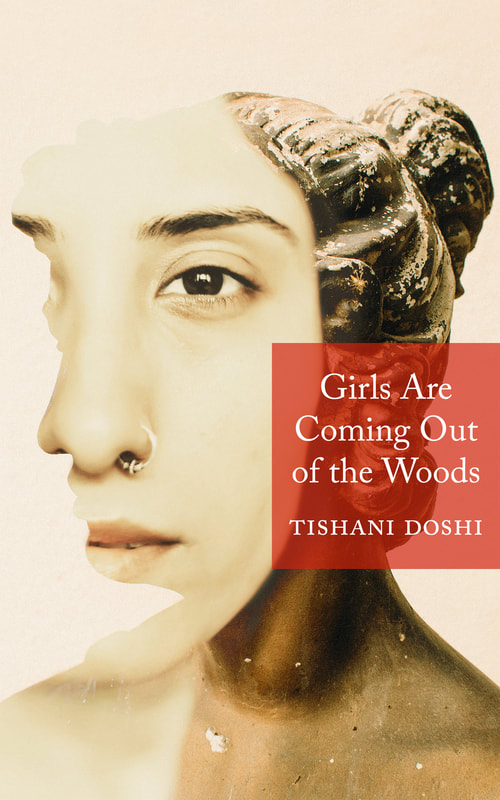
"Among the multiple questions posed by the book, two stand out: “what of ruined flesh?” and “Do you feel destroyed,/ girl?” Doshi leads a serious interrogation, but her work isn’t without playfulness and sarcasm, and she takes pleasure in such simple turns as describing landscapes or weather: “The washing’s on the line./ There are pillows in the grass./ All the weeds we pulled up yesterday/ lie in clotted heaps, dying slowly.” Doshi’s searing imagery and high lyrics are bound to take readers’ breath in equal measure." PUBLISHERS WEEKLY
"....a haunted and haunting collection full of richly woven narratives of loss and grief and beauty and yearning. The landscapes of Doshi’s poems are so brightly imagined that I can smell their trees and see their flowers. I can hear birds calling, though I wonder, always, whether her birds are leading me to safety or to danger. These poems’ waves spit up Styrofoam and fishing lines and “orphaned slippers” as frequently as food. Their parties offer “rustling table clothes” and wine glasses and puppies and crowds of dead girls. There is humor here, a great deal of it, and horror, too. The poems are packed with the things of this world—and, I will add, they are set in many places. They can’t ignore the realities of the peril faced by so many on this planet, but these poems are charged by the planet’s life force. They insist on survival." -- Camille T. Dungy, ORION MAGAZINE
"Undergirding this book is a faith in primal forces of living, water being among the most crucial, and if any poet shy of Transtromer has created a metaphorical ecosystem of her sea-side world its Doshi....This is a strong, companionable book for heartsick times." John Freeman, LITHUB
"Doshi’s anthems feel like a call to action, as all anthems should" WASHINGTON INDEPENDENT REVIEW OF BOOKS
”She is wonderful, it’s like reading Lorca on speed, if it wasn’t for the fact that this is not artificially mediated, it is the thing itself. Life. You can never be done with it, because the linguistic mastery is so closely woven into the fluttering, materialistic, existential reality. Everything is in constant flux, like the light in April.”
Jakob Brønnum, POV INTERNATIONAL
GIRLS ARE COMING OUT OF THE WOODS
(BLOODAXE BOOKS, UK) IS A PBS SUMMER RECOMMENDATION & SHORTLISTED FOR THE 2018 TED HUGHES AWARD
(BLOODAXE BOOKS, UK) IS A PBS SUMMER RECOMMENDATION & SHORTLISTED FOR THE 2018 TED HUGHES AWARD
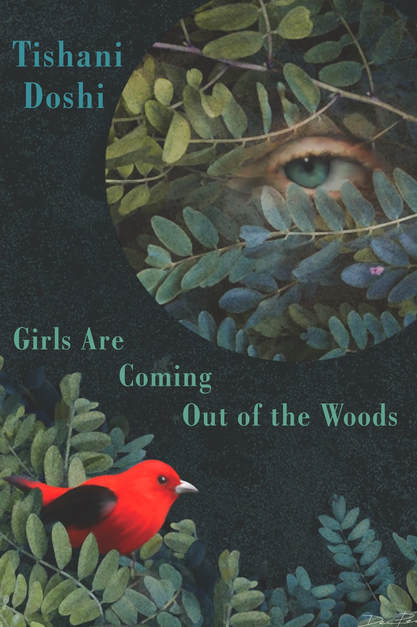
"Violence is no longer confined to the woods, that dark interior of childhood fear and desire. This is no fairytale. The wronged and murdered women....will no longer be silenced....It’s impossible not to cheer the boldness and liberation enacted by much of this book, and to be stirred by its bravery.To paraphrase one interviewer, Doshi is writing the anthems of her generation."
SANDEEP PARMAR, THE GUARDIAN
"I’ve already read Tishani Doshi’s poetry collection Girls Are Coming Out of the Woods (Bloodaxe) but I know I’ll return to it many times. One of the poems talks about poets ‘holding the throat of life/ till all the sunsets and lies are choked out/ till only the bones of truth remain’ - that’s precisely what Doshi does in this intelligent, elegant, unflinching collection. It’s very much a collection for this moment in history, but one that will endure long past it." KAMILA SHAMSIE
"Doshi’s work is like the music of Shostakovich; it gives no quarter but compels you to listen anyway and sometimes there is a beautiful lyricism to chase away the scary bits so that you think maybe you were wrong and the other bit wasn’t as scary as you thought even though you know it was, really." WALES ART REVIEW
SANDEEP PARMAR, THE GUARDIAN
"I’ve already read Tishani Doshi’s poetry collection Girls Are Coming Out of the Woods (Bloodaxe) but I know I’ll return to it many times. One of the poems talks about poets ‘holding the throat of life/ till all the sunsets and lies are choked out/ till only the bones of truth remain’ - that’s precisely what Doshi does in this intelligent, elegant, unflinching collection. It’s very much a collection for this moment in history, but one that will endure long past it." KAMILA SHAMSIE
"Doshi’s work is like the music of Shostakovich; it gives no quarter but compels you to listen anyway and sometimes there is a beautiful lyricism to chase away the scary bits so that you think maybe you were wrong and the other bit wasn’t as scary as you thought even though you know it was, really." WALES ART REVIEW
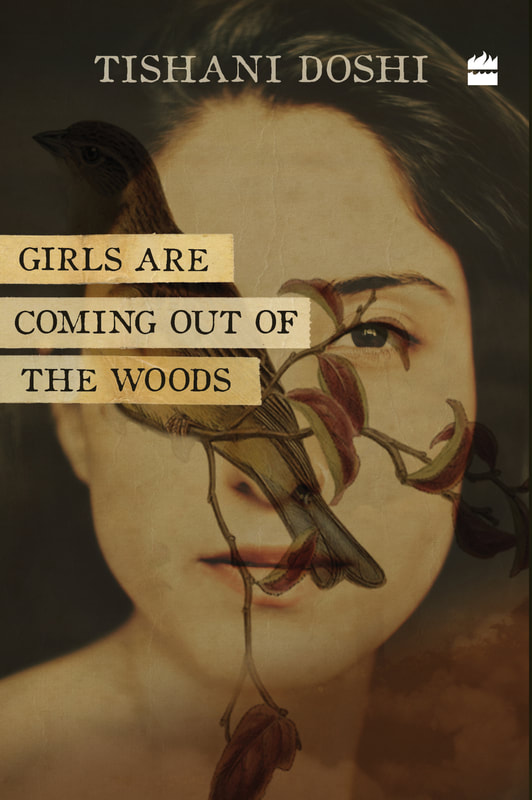
I admire these poems because they are masterly formal inventions. But I return to them, again and again, for the elegy and the urgency and the prophecy. I want to give this book to the people I love, and say to them, memorize this, never forget.
JEET THAYIL
These powerful haunting poems welcome the wildly assorted flotsam of daily detail and transmute them into the greater strangeness of poetry. Elegiac and fevered, Tishani Doshi’s poems seek ways to make their peace with tide and temporality, with fragility and violence, even as they celebrate that there is really ‘no end to unknowing’.
ARUNDHATHI SUBRAMANIAM
In Girls are Coming out of the Woods, Tishani Doshi combines artistic elegance with a visceral power to create a breathtaking panorama of danger, memory, beauty and the strange geographies of happiness. This is essential, immediate, urgent work and Doshi is that rare thing, an unashamed visionary who knows that, "while you and I go on with life / remembering and forgetting, / the poets remain: singing, singing."
JOHN BURNSIDE
"Pick up this book. Like I did, carry it with you wherever you go... Listen to the girls coming out of the woods. Their words will change your life." MEENA KANDASAMY
JEET THAYIL
These powerful haunting poems welcome the wildly assorted flotsam of daily detail and transmute them into the greater strangeness of poetry. Elegiac and fevered, Tishani Doshi’s poems seek ways to make their peace with tide and temporality, with fragility and violence, even as they celebrate that there is really ‘no end to unknowing’.
ARUNDHATHI SUBRAMANIAM
In Girls are Coming out of the Woods, Tishani Doshi combines artistic elegance with a visceral power to create a breathtaking panorama of danger, memory, beauty and the strange geographies of happiness. This is essential, immediate, urgent work and Doshi is that rare thing, an unashamed visionary who knows that, "while you and I go on with life / remembering and forgetting, / the poets remain: singing, singing."
JOHN BURNSIDE
"Pick up this book. Like I did, carry it with you wherever you go... Listen to the girls coming out of the woods. Their words will change your life." MEENA KANDASAMY
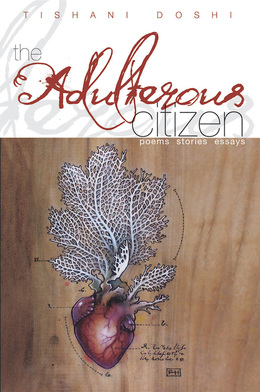
TISHANI DOSHI BECOMES THE FIRST INDIAN WRITER
TO BE PUBLISHED BY THE CARIBBEAN PUBLISHERS,
HOUSE OF NEHESI
The Adulterous Citizen is a collection of poems, stories and essays that explore the obsession for home, and for the journey.
Doshi takes us on a train ride across India into self-discovery and a teenager's failed escape on the American Road, into a house of childhood ghosts, and on a journey of a delusional widow in the Himalayas.
Travelling along are those abstract countries of memory and the imagination, the author's constant companions.
GET THE ADULTEROUS CITIZEN HERE!
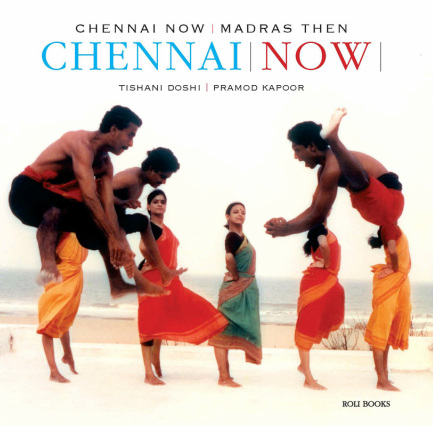
"Madras Then|Chennai Now is a brilliant visual tribute to a city's past and present.... "- The New Indian Express
"One day in the not too distant future, there’s a possibility that this city I call Madras and most call Chennai will grow so large it will become a megacity including Pondicherry and all the towns in between. Will they change the name of the city again? Perhaps. One thing I know for sure is that the residents of this megacity will have their eyes fixed on the horizon, because the horizon is the way out and the way back in." - TD
A coffee table book that celebrates a city of dual names and personalities.
"Madras Then" introductory essay by Dr Nanditha Krishna
"Chennai Now" introductory essay by Tishani Doshi
Photo Editor and Publisher: Pramod Kapoor, Roli Books
"One day in the not too distant future, there’s a possibility that this city I call Madras and most call Chennai will grow so large it will become a megacity including Pondicherry and all the towns in between. Will they change the name of the city again? Perhaps. One thing I know for sure is that the residents of this megacity will have their eyes fixed on the horizon, because the horizon is the way out and the way back in." - TD
A coffee table book that celebrates a city of dual names and personalities.
"Madras Then" introductory essay by Dr Nanditha Krishna
"Chennai Now" introductory essay by Tishani Doshi
Photo Editor and Publisher: Pramod Kapoor, Roli Books
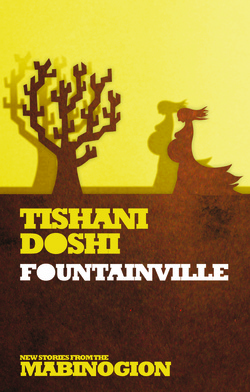
"Tishani Doshi's retelling of the story of Owain, or The Lady of the Fountain, completes Seren's 10- volume reworking of the Mabinogion by contemporary writers. The story of Owain, a knight of the Round Table, has a complex history and crops up in other cultures as well as in Welsh legend. Fitting then that Doshi, whose parentage is Welsh and Gujarati, should pick up the baton and run to India's rich mythological landscape" -- The Guardian
"People know our town because of the fountain. For centuries, grannies and god-men have been saying, Go to Fountainville. Go to Fountainville, and you’ll be cured of all your problems. Arrive there barren, tired, deprived, mad, washed inside out with nowhere else to go, and you might be restored. They’ve been spinning stories from the beginning, of course, about places that are holier than others— villages along river banks where it’s auspicious to die, citadels where eternal flames burn, pilgrim centres to heal your heart. In the old myths and the new, there have always been places with special powers, and Fountainville is such a place...." (from Fountainville)
"People know our town because of the fountain. For centuries, grannies and god-men have been saying, Go to Fountainville. Go to Fountainville, and you’ll be cured of all your problems. Arrive there barren, tired, deprived, mad, washed inside out with nowhere else to go, and you might be restored. They’ve been spinning stories from the beginning, of course, about places that are holier than others— villages along river banks where it’s auspicious to die, citadels where eternal flames burn, pilgrim centres to heal your heart. In the old myths and the new, there have always been places with special powers, and Fountainville is such a place...." (from Fountainville)
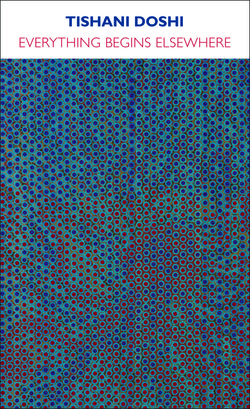
“These poems move in different directions, as true poetry should. We hear in them joy and sadness, praise and lament, love and disenchantment-- simultaneously. Tishani Doshi speaks courageously about herself, about her choices, about the growing shadows. It’s a beautiful book”-- Adam Zagajewski
"Throughout Tishani Doshi's second book of poems, Everything Begins Elsewhere, human bodies take center stage, antagonized both by intimate physical limitations and by the borders of space and time. Like the ocean waves gathering and breaking in Doshi's poem "Lesson 2: Learning Mudras in Bhutan" we experience the coming together and moving apart intrinsic to the cycles of love and relationship. In these lithe poems, Doshi, a true citizen of the world who is also a celebrated dancer and novelist, navigates the modern era of cross-cultural contact. As much about reclamation as loss, her poems assert exhilaratingly that through the act of vanishing, we may be shaped into existence again"
- Copper Canyon Publishers
"Throughout Tishani Doshi's second book of poems, Everything Begins Elsewhere, human bodies take center stage, antagonized both by intimate physical limitations and by the borders of space and time. Like the ocean waves gathering and breaking in Doshi's poem "Lesson 2: Learning Mudras in Bhutan" we experience the coming together and moving apart intrinsic to the cycles of love and relationship. In these lithe poems, Doshi, a true citizen of the world who is also a celebrated dancer and novelist, navigates the modern era of cross-cultural contact. As much about reclamation as loss, her poems assert exhilaratingly that through the act of vanishing, we may be shaped into existence again"
- Copper Canyon Publishers
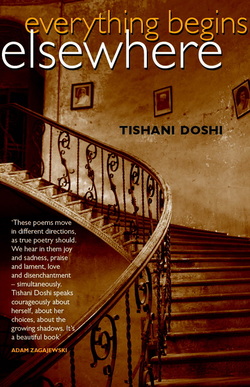
“There is a fierce power to Tishani Doshi’s poetry.
Delicate as spun silk, it draws us into the zone of desire, even as it
opens us to what lies beyond – the quick of the metaphysical. Places
slip and slide and melt into each other -- lover, mother, father,
brother appear and disappear, time perfects itself as eternal
vanishing.”
- Meena Alexander
"In her poems of elemental yearning and desire, Tishani Doshi creates and shares a metaphysical world which 'begins and ends. Begins and ends again.' She seeks the pulse of the world: 'all I can muster is to lie with you/ on the monastery floor, guide your fingers to the door-/ways of my shattered heart, so you can feel it too -/ the ocean that travels with me; how it gathers and breaks,/ gathers and breaks…'
Her consciousness of this internal movement is as intense as her sense of the unseen presences that call out to us. The rain, the wind, a dog's bark, the monsoon 'when the hymen/ of the earth/ is torn into...'" -- THE HINDU
- Meena Alexander
"In her poems of elemental yearning and desire, Tishani Doshi creates and shares a metaphysical world which 'begins and ends. Begins and ends again.' She seeks the pulse of the world: 'all I can muster is to lie with you/ on the monastery floor, guide your fingers to the door-/ways of my shattered heart, so you can feel it too -/ the ocean that travels with me; how it gathers and breaks,/ gathers and breaks…'
Her consciousness of this internal movement is as intense as her sense of the unseen presences that call out to us. The rain, the wind, a dog's bark, the monsoon 'when the hymen/ of the earth/ is torn into...'" -- THE HINDU
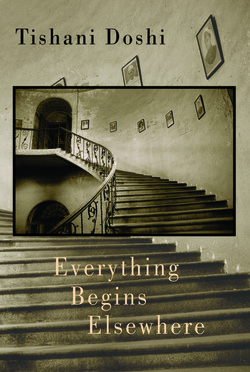
“Doshi’s poems embody a world of longing – her laments and dreams sear the reader’s senses, setting their world alight. She makes you want to dance to the strings of her taut and tender soundboard, and echo aloud her fathomless world. Here is a poet with lyrical acuity in abundance.” - Menna Elfyn
"Doshi frequently employs Dante's trope of selva oscura, the dark wood, to represent the love relationship, so there is a metaphorical parallel to these paired ideas. However, she also knows how to pitch the artful against the blunt, the symbolically charged against the thing itself, to forceful effect." - The Guardian
"Doshi frequently employs Dante's trope of selva oscura, the dark wood, to represent the love relationship, so there is a metaphorical parallel to these paired ideas. However, she also knows how to pitch the artful against the blunt, the symbolically charged against the thing itself, to forceful effect." - The Guardian
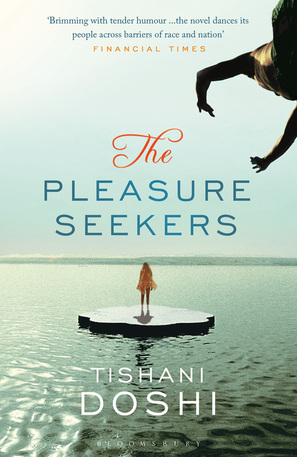
"This is a captivating, delightful novel. I was totally engaged by Tishani Doshi's people and by their world, and the language often rises – when speaking of the great matters, life, death, and above all love – to powerful metaphorical heights” - Salman Rushdie
“I read this book almost in one sitting, and became completely engaged by the characters. I suffered those horrible familiar pangs of literary envy” - Louis de Bernières
“The Pleasure Seekers is beautifully written, engrossing and – a word I don't often use when describing a good book – lovely. Emotionally successful families are rare in fiction; they are harder to capture than the disastrous ones. But Tishani Doshi carries it off brilliantly” - Roddy Doyle
“A beguiling first novel: a gentle, funny and readable tribute to her parents’ marriage … an intensely charming and sweet-natured book … a seductive and lovable novel: it is about pleasure sought and, more importantly, pleasure found” - Guardian
“The clash of cultures makes up for some very engaging writing … They’re a rather mixed up lot, but then so is the outside world – this family saga is played out against the chaotic background of recent history, from the murder of Indira Gandhi to the arrival in India of cable television. Beautifully written, with a superb cast of characters” - The Times
“An old-fashioned story of forbidden love” - Observer
“I read this book almost in one sitting, and became completely engaged by the characters. I suffered those horrible familiar pangs of literary envy” - Louis de Bernières
“The Pleasure Seekers is beautifully written, engrossing and – a word I don't often use when describing a good book – lovely. Emotionally successful families are rare in fiction; they are harder to capture than the disastrous ones. But Tishani Doshi carries it off brilliantly” - Roddy Doyle
“A beguiling first novel: a gentle, funny and readable tribute to her parents’ marriage … an intensely charming and sweet-natured book … a seductive and lovable novel: it is about pleasure sought and, more importantly, pleasure found” - Guardian
“The clash of cultures makes up for some very engaging writing … They’re a rather mixed up lot, but then so is the outside world – this family saga is played out against the chaotic background of recent history, from the murder of Indira Gandhi to the arrival in India of cable television. Beautifully written, with a superb cast of characters” - The Times
“An old-fashioned story of forbidden love” - Observer
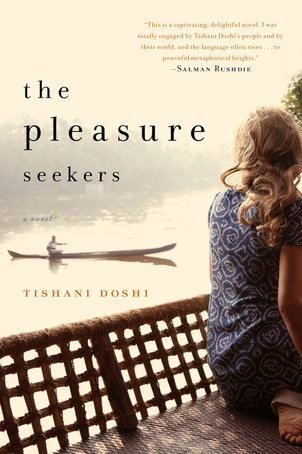
“Luminous comedy … her debut novel, brimming with tender humour, has the endeared feel of family history … The episodic narrative has a carnivalesque feel … Lithe and agile, the novel dances its people across barriers of race and nation … the marvels of Doshi’s language and a spirit of merriment create a fictional world in which, as in Shakespeare’s “hey nonny nonny”, sounds of woe convert into marriage’s “tha-ra-rum-pum-pum”, love’s “ba-ba-boom” - Independent
“Cross-cultural love story that spans three decades … Laced with charm, and instantly familiar, this is top drawer comfort reading” - Financial Times
“A family saga that reads more as a personal odyssey. It convinces, entertains and, at times, reminds the reader of how tough it is to be human … This big-hearted, engaging novel will appeal to as many readers as there are lovers; winners and losers; dreamers and survivors” - Eileen Battersby, Irish Times
“An award-winning poet’s debut novel is a charming, moving, cross-generational tale” – The Daily Beast
“Tishani Doshi’s The Pleasure Seekers delights” – Vanity Fair
“Cross-cultural love story that spans three decades … Laced with charm, and instantly familiar, this is top drawer comfort reading” - Financial Times
“A family saga that reads more as a personal odyssey. It convinces, entertains and, at times, reminds the reader of how tough it is to be human … This big-hearted, engaging novel will appeal to as many readers as there are lovers; winners and losers; dreamers and survivors” - Eileen Battersby, Irish Times
“An award-winning poet’s debut novel is a charming, moving, cross-generational tale” – The Daily Beast
“Tishani Doshi’s The Pleasure Seekers delights” – Vanity Fair
TRANSLATIONS.
THE PLEASURE SEEKERS IS PUBLISHED IN:
ITALY BY FELTRINELLI,
IN SPAIN BY MONDADORI,
IN GERMANY BY BERLIN VERLAG,
IN FRANCE BY BUCHET-CHASTEL
AND IN POLAND BY SWIAT KSIAZKI
THE PLEASURE SEEKERS IS PUBLISHED IN:
ITALY BY FELTRINELLI,
IN SPAIN BY MONDADORI,
IN GERMANY BY BERLIN VERLAG,
IN FRANCE BY BUCHET-CHASTEL
AND IN POLAND BY SWIAT KSIAZKI
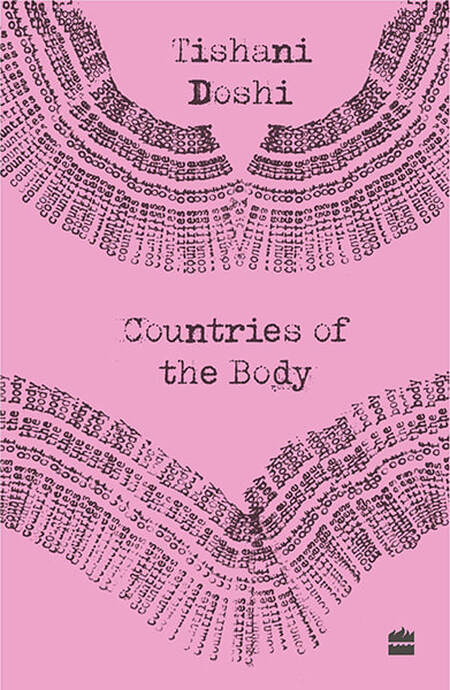
WINNER OF THE FORWARD PRIZE FOR BEST FIRST COLLECTION , 2006
A striking, emergent talent who is prepared to take risks in pursuit of sensual, emotionally engaged and passionate poetry' – John Burnside, Forward Prize judge's comment
[A]n eloquent dissection of the body, its attributes, metaphors, deficiencies and contradictions - all delivered in chromatic, richly textured lines, in which the assured manipulation of rhythm and internal rhyme produces poems of remarkable balance and grace. -- The Guardian
Tishani Doshi in her Countries of the Body has written some rich poems with powerful images. They have the slow curved rhythms of a dancer in their movement. The poet has a passionate sense of the sacred. Poems for her are not statements; they are meditations.…There is magic in her poems.
— U.R. Ananthamurthy
"The language of Tishani Doshi's haunting, assured, delicately crafted poems, which look both east and west, is wonderfully fresh and precise."
-- Ruth Padel
"Tishani Doshi's poems have both heart and intelligence...you could read them a hundred times and still find something you hadn't noticed before." Louis de Bernieres
